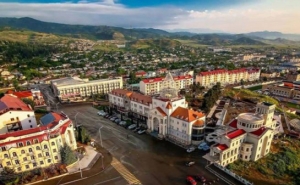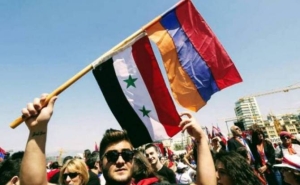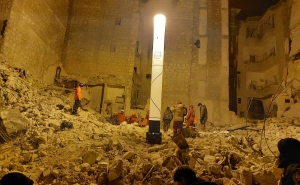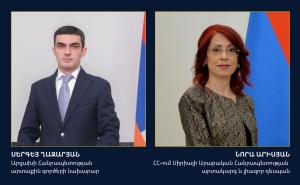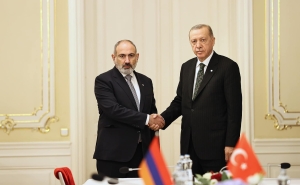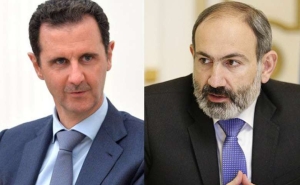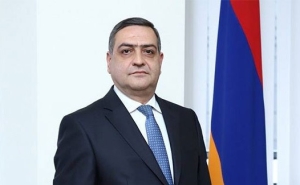 Syrian Conflict in 2016: Comprehensive Settlement May Become the Key
Syrian Conflict in 2016: Comprehensive Settlement May Become the Key
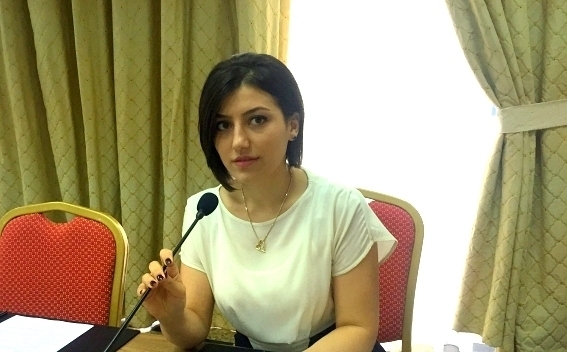
The crisis that began in Syria in 2011 as a continuation of the "Arab Spring" deepens. According to the UN, during more than 5 years of the Syrian conflict death toll has reached about half a million. The current situation in Syria and around it is much more complicated than it was 5 years ago, when the crisis started. There is a danger of direct confrontation between the US and its NATO allies and Russia. On the one hand it seems that efforts are being made towards a political settlement of the Syrian crisis but on the other hand hostilities are not likely to cease.
Demonstrations calling for constitutional reforms that began 5 years ago quickly grew into clashes with human casualties. In a very short period many external forces were involved in the crisis taking the conflict to the international platform. The year of 2013 brought a new escalation when the West accused Assad's regime of using chemical weapons. Due to the destruction of the Syrian chemical weapons it became possible to prevent direct American military intervention, but the tension did not grow weak. One of the main reasons was the transformation of the opposition groups, resulting in the emergence of "Islamic State", "Jabhat An-Nusra", "Ahrar Al-Sham" and other terrorist organizations. The "Islamic State" has become the "common enemy" that almost every side announces about fighting against it, but till now it has not become possible to consolidate fight against it.
What is the reason of failure to resolve the conflict?
The main problem is that there are too many sides involved in the crisis. Their interests and positions are quite different. The forces that are involved in crisis today can be divided into "Pro-Assad " and "Anti-Assad" camps. The first group includes the Syrian governmental forces and military units, Iran and Lebanese "Hezbollah" Shiite group, as well as Russia. The main actors of the "Anti-Assad" camp are Turkey, the Western countries, the Gulf states, as well as different "moderate opposition" and terrorist groups. Syrian Kurds (about 10% of the population) are another side of the conflict. They submit a bid to establish an independent Kurdish entity.
Another reason why the crisis deepened is that too many interests intersect in Syria. On the one hand it is the Sunni-Shia conflict. On the other hand we witness global confrontation between Russia and the West. In addition, we see different interests of ethnic and religious groups that further deepens the conflict.
Another problem is the transformation of the crisis. The conflict continually exposes to new transformations that does not make possible to fix stable situation and try to find a solution. For example, in the beginning of 2016, when it seemed that the dialogue between Russian and the US can provide conditions for settlement, Turkey began military operation in Syria, establishing a new situation in the crisis. The other example of the above mentioned problem is the transformation of the so-called "moderate opposition" forces into the terrorist armed groups.
How does Assad manage to keep the power?
The first and the most important reason is that the Syrian President really maintains support within his country. Sometimes attempts are made to present the conflict as a fight of the Sunni majority against Alawites that make up only 10% of the Syrian population. But it cannot be true for some reasons. First, the Assad regime enjoys the support of a significant part of moderate Sunnis in Syria.
Second, the government is the only force today that is able to fight against terrorists. Both internal and external forces are aware that there is no real alternative to Assad’s regime or the ruling Baath party. The only alternative today are the radical Islamic forces. This was proved also by the experience of the "Arab Spring". Developments in Iraq, Tunisia, Libya, Egypt made it clear that the only alternative may be an uncontrollable chaos.
Third, it is clear that the external support had an important role in Assad's survival.
It should be noted that steps that have been made towards political settlement of the crisis till now have failed. The failure of the negotiations make it clear that real dialogue needs political will. All the forces directly or indirectly involved in the conflict should be ready to lay down arms. But it is too early as the forces involved have not satisfied their interests yet. In addition none of forces involved in military actions is able to make a real breakthrough, getting full advantage over the other. Thus, any agreement cannot be stable or promote the long-term settlement.
Developments in Syria, as well as in wider Middle East prove that coordinated and comprehensive approach is needed. It is not excluded that the key to solution lies in the unified consideration of regional crises and comprehensive settlement. There is a need of such a solution that can establish stability not in one country, which is impossible in conditions of total chaos, but the whole region.
-
 17:08
17:08The regular session of the Anti-corruption Policy Council takes place in Jermuk
-
 15:05
15:05The Prime Minister sends congratulatory messages to the supreme leader of Iran and the President of Iran
-
 11:11
11:11Armenia sends earthquake aid to Turkey
-
 10:43
10:43Commemoration of the Pontiff St. Sahak Partev
-
 09:16
09:16Some roads are closed and difficult to pass in Armenia
-
 19:55
19:55Phone conversation of the Foreign Minister of Armenia with the U.S. Assistant Secretary of State for European and Eurasian Affairs
-
 18:30
18:30Prime Minister Pashinyan and President Khachaturyan meet
-
 18:20
18:20Ararat Mirzoyan with Co-Chairman of the OSCE Minsk Group of France Brice Roquefeuil
-
 17:01
17:01Humans could land on Mars within 10 years, Musk predicts
-
 16:45
16:45France, US urge 'immediate' end to Nagorno Karabakh blockade
-
 16:01
16:01Blockaded Nagorno Karabakh launches fundraiser to support quake-hit Syria
-
 15:59
15:59Earthquake death toll in Turkey rises to 18,342
-
 15:43
15:43Ararat Mirzoyan Held a Telephone Conversation with Sergey Lavrov
-
 15:06
15:06French president rules out fighter jet supplies to Ukraine in near future
-
 14:47
14:475 Day Weather Forecast in Armenia
-
 14:44
14:44President Vahagn Khachaturyan wrote a note in the book of condolences opened in the Embassy of Syria in Armenia
-
 14:20
14:20Azerbaijan’s provocations impede establishment of peace and stability – Armenian FM tells Russian Co-Chair of OSCE MG
-
 12:57
12:57France representation to OSCE: Paris calls on Azerbaijan to restore freedom of movement through Lachin corridor
-
 11:40
11:40Command of Kosovo forces highly appreciated preparation of Armenian peacekeepers
-
 10:16
10:16The United States withdrew from sanctions against Syria for six months the provision of assistance after the earthquake
day
week
month
Humidity: %
Wind: km/h


